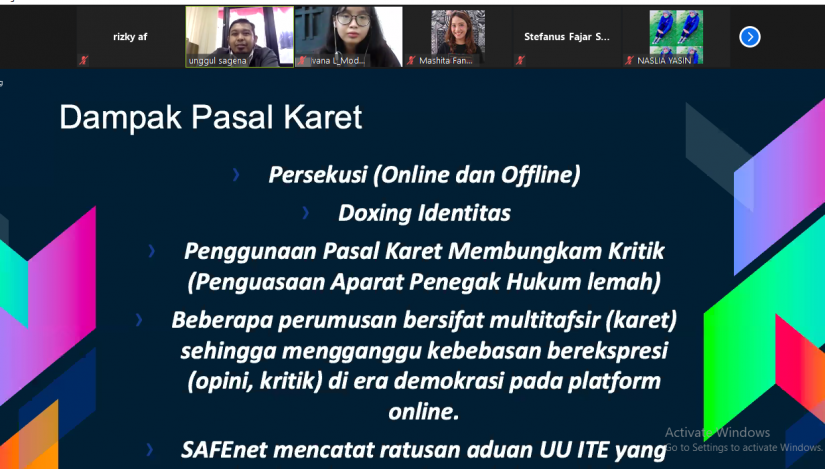
Yogyakarta, August 13th 2020—In June, In June, a case of alleged methamphetamine use has emerged against comedian Bintang Emon after he gave a criticism on social media regarding the prosecutor’s demands in the case of pouring hard water against Novel Baswedan. This case showed us, even though its characteristic was user generated content, giving opinion on social media is not completely free and bound by certain restrictions or controls.This issue was discussed in the Komako (Communication Student Corps) Monthly Discussion UGM which presented two speakers, they were Mashita Fandia as a lecturer of Department of Communication Science and Unggul Sagena as the Head of Information Access Division of SAFEnet (12/08). The discussion was titled as ‘Social Media: Aspiration’s Container or Aspiration’s Boomerang?’. It discussed the limitations that appeared on social media and guidelines in using social media.
Mashita explained that her research in the last two years regarding youth interactions with social media showed that almost all informants initially had a mindset that social media offered full freedom of expression without any limitations. Turns out, there were several limitations that appeared when we used social media, whether we realize it or not. limitations on social media are in the form of supervision that could be done by anyone, even fellow social media users.
“One of them is when people want to upload something on Instagram, and there are many considerations, for example, other people’s judgments. Or when someone chooses between social media platforms, for example, Twitter for criticizing and Instagram for fun. Without realizing it, those things showed the standards which limit us on social media,” Mashita said.
Regarding law issues, Mashita said that technology was always faster than regulations. For example, the Electronic Information and Transactions Act (UU ITE) in Indonesia was still a problematic regulation, even though the development of technology and media has grown rapidly. Other than that, law enforcement officials in Indonesia still have different interpretations of the law enforcement and implementation. This is still a problem related to freedom and limitations on social media.
In this regard, Unggul said that several articles of the EIT Act were indeed multiple interpretations and often misused. Some of them were the EIT act Article 27 Sentence 1 concerning violations of decency and Sentence 3 concerning defamation, also Article 28 Sentence 1 regarding fake news and Sentence 2 concerning hate speech and hostility. There are concerns that the four articles which are often called the “rubber articles” could encourage the practice of persecution and doxing, or dissemination of personal information to the public, silencing, and disrupting freedom of expression on social media.
One of the hopes to make users safe about the right of freedom of speech on social media is through revisions or clearer derivative regulations of the EIT Act. For example explaining the extent of the indicators of defamation or hatred. However, it should be remembered that the problem of legislation in Indonesia is quite complex. It took a long time to implement this regulation, especially since there are many other designs waiting to be processed and passed.
Therefore, Unggul describes several guidelines that can be used by social media users. Basically, control in social media consists of four stages. The first, control over system settings, for example set the account to be public or private. In addition, users also have to control interactions, for example choosing friends, unfollowing, blocking, and taking breaks using social media if they feel they are not healthy.
Second, control by users through literacy which includes digital ethics and hygiene. Digital literacy starts from how we are able to understand content, analyze, and select content that we can share. The third is the control of platform providers who can takedown content or determine age restrictions. If the user is able to adjust the three controls, it is hoped that there will be no problems with the fourth control, namely law or regulation.
Mashita also added that the influence of social media is all under one’s own control. Filter our opinions and when we find opposing opinions on social media, we can be wise not to judge right away. This can actually trigger us to think about why there are different understandings and open a space for discussion together.
Unggul stated that expression on social media is certainly not wrong, considering that freedom of expression has also been regulated in Article 28E of the Constitution of 1945. In addition, social media can also be useful for neutralizing cases that may not have been followed up by certain parties, as long as they are supported by valid data or experience. However, there are several things that users must pay attention to, namely differentiating public and private spaces, understanding rights and obligations, understanding privacy protection, knowing the concept of information, and still understanding culture and ethics. Don’t let social media make Indonesia’s heritage such as deliberation or hospitality fade away.
